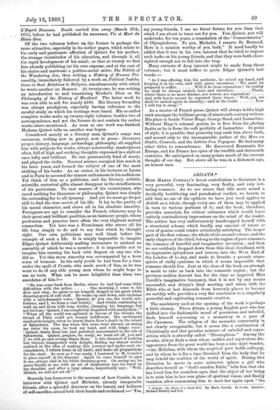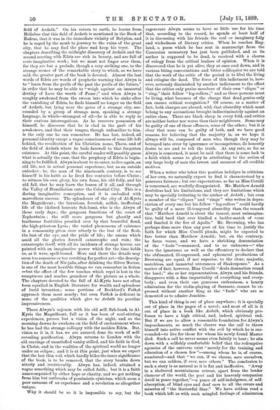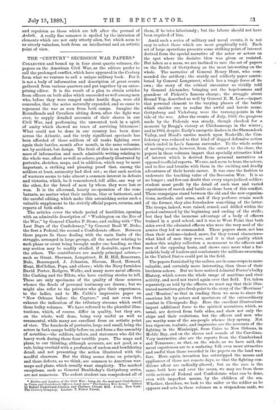ARDATH.*
Miss MARIE CORELLI'S latest contribution to literature is a
very powerful, very fascinating, very faulty, and very irri- tating romance. As we are aware that this must sound a decidedly bewildering and paradoxical verdict, we hasten to
add that no one of the epithets we have just used applies to Ardath as a whole, though every one of them may be applied
in turn to various portions of it; and the book, therefore, provides materials for critical estimates which would leave entirely contradictory impressions on the mind of the reader.
The author has very unfortunately handicapped herself with a structural scheme which hardly any amount of talent or even of genius could render artistically satisfying. The larger part of the first volume, the whole of the second volume, and the early chapters of the third, belong to the region of pure romance, the romance of fanciful and imaginative invention ; and then we are suddenly dropped down from this ideal cloudland, with its impressive splendours and terrors, into the West End of the London of to-day, and made to breathe a prosaic atmom sphere of chilly cynicism in which it seems impossible that romance should live. Just at the close of the book, an attempt is made to take us back into the romantic region ; but the previous sudden descent has for the time so impaired Miss Corelli's imaginative buoyancy, that it is not by any means successful, and Alwyn's final meeting and union with the Edris who at last descends from heavenly places to become an earthly wife, provides a very fiat conclusion to a singularly powerful and captivating romantic creation.
The machinery used at the opening of the work is perhaps a little clumsy. Theos Alwyn, a young English poet who has
drifted into the fashionable mood of pessimism and unbelief, finds himself sojourning at a monastery in a pass of the Caucasus. The religion of the monastic community is
not clearly recognisable, but it seems like a combination of Christianity and that peculiar mixture of unbelief and super- stition which is absurdly called "Theosophism." Among the monks, Alwyn finds a man whose sudden and mysterious dis- appearance from the great world has been a nine days' wonder„ —one Heliobas, with whom the sceptical poet holds colloquy, and by whom he is for a time liberated from the body that he - may behold the realities of the world of spirit. During this liberation be meets in some unknown sphere a girl who describes herself as "God's maiden Edna," tells him that she has loved him for countless ages, that the object of her being is to raise him to her own plane of spiritual vision, and finally vanishes, after summoning him to meet her again upon "the • Ardath the Story of a Dead Selj: By Marie Corelli. In 3 vole. London: Richard Bentley and Eon.
field of Ardath." On his return to earth, he learns from Heliobas that this field of .Ardath is mentioned in the Book of Esdras, that it was in the immediate vicinity of Babylon, and he is urged by the monk to journey to the ruins of the great city, that he may find the place and keep his tryst. The
chapters describing the midnight discovery of Ardath and the second meeting with Edris are rich in beauty, and are full of eerie imaginative work ; but we Enlist not linger over them, for they are but a prelude, though a very striking one, to the strange scenes of the remarkable story to which, as we have said, the greater part of the book is devoted. Almost the last words of Edris are words of prophetic warning that Alwyn is to "learn from the perils of the past the perils of the future," in order that he may be able to "weigh against an immortal destiny of Love the worth of Fame ;" and when Alwyn is roughly awakened from the swoon into which he sinks after the vanishing of Edris, he finds himself no longer on the field of Ardath, but lying near the gates of a strange city, sur- rounded by a group of strange men, speaking a strange language, in which—strangest of all—he is able to reply to their curious interrogations. As he recovers possession of himself, he discovers that he is clad in the garb of his aviak-eners, and that their tongue, though unfamiliar to him, is the only one he can remember. He has lost, indeed, all personal identity except a vague consciousness of some life left behind, the recollection of his Christian name, Theos, and of the field of Ardath where he bade farewell to that forgotten existence. At this point, the careful reader will possibly guess what is actually the case, that the prophecy of Edris is begin- ning to be fulfilled. Alwyn is about to re-enter, to live again, an old life, not in actual personal experience, but as an outside onlooker : he, the man of the nineteenth contury, is to see himself in his habit as he lived five centuries before Christ; to witness his own glory, his own fame, his old folly, and his old fall, that he may learn the lesson of it all, and through the Valley of Humiliation enter the Celestial City. This is a daring imaginative conception, and it is embodied with marvellous success. The splendours of the city of Al-Kyris the Magnificent ; the luxurious, feverish, selfish, ineffectual life of the idolised laureate Sah-lumi, who is the Alwyn of those early days ; the gorgeous functions of the court of Zephorinim ; the still more gorgeous but ghastly and loathsome festivities presided over by that beautiful fiend, the high-priestess Lysia ; the varied phenomena of existence in a community given over utterly to the lust of the flesh, the lust of the eye, and the pride of life ; the omens which amid all the glories foretell catastrophe and ruin; the catastrophe itself, with all its incidents of strange horror, are painted with an imaginative power which for the time holds us, as it were, spell-bound. Here and there the details may seem too sensuous or too revolting for perfect art—the descrip- tion of the death of Nir-jalis, after drinking the Silver Nectar, is one of the most horrible things we can remember in fiction ----but the effect of the few touches which repel is lost in the sumptuous and sombre grandeur of the picture as a whole. The chapters devoted to the fall of Al-Kyris have not often been equalled in English literature for wealth and splendour of lurid invention ; some portions of Beckford's Vathek approach them most nearly; but even Vathek is deficient in some of the qualities which give to Ardath its peculiar impressiveness.
Theos Alwyn's sojourn with his old self, Sah-lum11,, in Al- Kyris the Magnificent, full as it has been of soul-stirring experiences, proves but a vision of the night, and as the morning dawns he awakens on the field of enchantment where he has had the strange colloquy with the maiden Edris. But, vision as it is, it has, we are assured, done its work of self- revealing purification. Alwyn returns to London with the old cravings of unsatisfied vanity stilled, and his faith in God, in Christ, and in the realities of the spiritual world no longer under an eclipse ; and it is at this point, just when we expect that the last thin veil, which hardly hides the inner significance of the book, is to be removed, that the story breaks down utterly and irretrievably. Alwyn has, indeed, attained a vague something which may be called faith ; but it is a faith unaccompanied by either hope or charity, and we get nothing from him but outbreaks of pessimistic cynicism, which seem a poor outcome of an experience and a revelation so altogether unique.
Why it should be so it is impossible to say, but the regenerate Alwyn seems to have so little use for his time that, according to the record, he spends at least half of it in discussing with his friends the real or imaginary folly and wickedness of literary critics. When he reaches Eng- land, a poem which he has sent in manuscript from the Caucasian monastery has just been published, and as its author is supposed to be dead, is received with a chorus of eulogy from the critical leaders of opinion. When it is discovered that he is yet alive, they at once cool down, and in various biting conversations and bitter soliloquies we are told that the work of the critic of the period is to libel the living and eulogise the dead. The force of this indictment is, how- ever, seriously diminished by another indictment to the effect that the critics only praise members of their own "clique" or "ring," their fellow "log-rollers ;" and as these persons must be living, what becomes of the charge that dead genius only can ensure critical recognition P Of course, as a matter of fact, both charges are absurd, with that absurdity which must belong to any accusations brought indiscriminately against an entire class. There are black sheep in every fold, and critics are neither better nor worse than their neighbours. Some may be guilty of one of these offences, some of the other; but it is clear that none can be guilty of both, and we have good reasons for believing that the majority is, as we hope it always will be, composed of men who, though they may be betrayed into error by ignorance or incompetence, do honestly desire to see and to tell the truth. At any rate, so far as Alwyn is concerned, it must be said that there is some lack in a faith which seems to glory in attributing to the action of any large body of men the lowest and meanest of all credible motives.
When a writer who takes this position indulges in criticism of her own, we naturally expect to find it characterised by a generous fairness ; but our expectations, so far as Miss Corelli is concerned, are woefully disappointed. Mr. Matthew Arnold doubtless had his limitations, and they are limitations which may be specially irritating to the author of Ardath ; but even a member of the " cliques " and " rings " who writes in depre- ciation of every one but his fellow " log-rollers " could hardly be guilty of a more ill-tempered absurdity than the remark that "Matthew Arnold is about the tamest, most unimagina- tive, bald bard that ever kindled a lucifer-match of verse and fancied it the fire of Apollo." Mr. Browning, who has perhaps done more than any poet of his time to justify the faith for which Miss Corelli pleads, might be expected to fare better than Matthew Arnold; but, on the contrary, he fares worse, and we have a shrieking denunciation of the "fools "—unnamed, and to us unknown—" who have the ignorance as well as the effrontery to declare that the obfuscated, ill-expressed, and ephemeral productions of Browning are equal, if not superior, to the clear, majestic, matchless, and immortal utterances of Shakespeare." As a matter of fact, however, Miss Corelli "deals damnation round the land;" she or her representatives, Alwyn and his Mends, disapprove with a fine impartiality of everything and every- body. ; and even their one generous enthusiasm, a hearty admiration for the violin-playing of Sarasate, cannot be ex- pressed without another fling at the " fools " who are so demented as to admire Joachim.
This kind of thing is out of place anywhere; it is specially out of place in the pages of a novel ; and most of all is it out of place in a book like Ardath, which obviously pro- fesses to have a high ethical, and, indeed, spiritual end. But if we are to allow a reasonable foundation for Alvryn's impeachments, so much the clearer was the call to throw himself into active conflict with the evil by which he is sur- rounded—to live for those for whom his newly found Master died. Such a call he never seems even faintly to hear; he sits down with a selfishly comfortable belief that the redemptive agencies of the universe exist "merely for the training and education of a chosen few "—among whom he is, of course, numbered—and that "we. can, if we choose, save ourselves, but we can seldom, if ever, save others." The conclusion to such a story is as natural as it is flat and ineffective. "Away in a sheltered mountainous retreat, apart from the louder clamour of the world, the poet and his heavenly companion dwell in peace together,"—a peace of se]f-indulgence, of self- absorption, of blind eyes and deaf ears to all the errors and miseries of "the Sorrowful Star." We have seldom read a book which left us with such mingled feelings of admiration and repulsion as those which are left after the perusal of Ardath. A really fine romance is spoiled by the intrusion of elements which are not only utterly alien, but which seem to us utterly valueless, both from an intellectual and an artistic point of view.




































 Previous page
Previous page